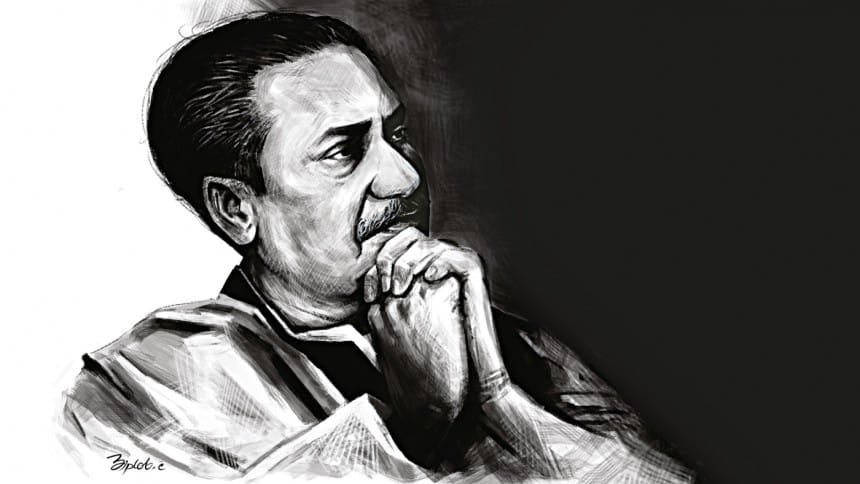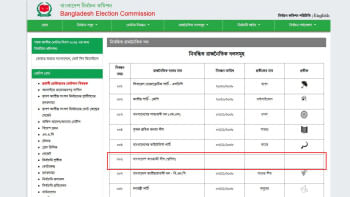The man, the murder and his destiny

It is quite astounding that he lived for only 55 years (1920-1975) and achieved so much. He may not have written treaties in philosophy, literature and science but he brought to life a social and political epic that transformed the life of millions of his people and channelled history in a direction that Bangalees only dreamt of but hardly believed that it would happen.
If we allow the first 18 years of his life for personal growth -- the universal age for young adulthood -- then within the subsequent 37 years he developed himself to be a man of strong personal character, found his calling of freeing his people, convinced them to follow his path, unified them into a political force, emboldened them to demand justice and freedom, and finally led them to their destiny of creating an independent state -- together making for a most successful political life in modern history.
In between, he spent nearly 13 years in jail, which amounted to almost one-third of his adult political life. To think that he organised, prepared and led his people to an armed struggle within a period of only two decades is nothing short of a miracle of achievement for any leader anywhere.
It is quite amazing how from the start he evolved into a people's man.
Public concerns always seemed to attract him. He almost instinctively converted what would start off as a demand of this or that group into his own, and within no time was able to bring all the votaries together and guide them to do something about it -- be it a matter pertaining to his school, his local football club and the like.
His taking charge of a situation came naturally and given his personality he would in no time become the central figure of any situation. What attracted others towards him was his dependability. He would not take up a cause today and forget about it tomorrow. If he made a commitment he would honour it. Along with dependability came the question of trust. He exuded trust because of his nature. Young boys who would gather around him, and later in life when people would flock to him, one of the main reasons would be the trust factor -- they could always count on him.
It was not in the birth of Pakistan -- in the struggle for which he was intimately involved both from his home town and in British Calcutta -- that he found his calling. It was in the gradual unfolding of the reality within which the Bangalees in East Pakistan lived and his intimate exposure to the oppressions they suffered that would strike a deep cord with his inner feelings thus transforming him from within.
The rights of the class-IV employees of Dhaka University, the founding of the Awami Muslim League, the Jinnah's speech triggering students and public outrage ("Urdu shall be the only state language of Pakistan"), the language movement and the wider issues of cultural identity, democratic rights, the fact of no election being held in the new state, military takeover and marginalisation of politicians and the throttling of almost all major dissenting voices transformed the young supporter of Pakistan of the early and mid-40s into the budding Bangalee nationalist of the late forties and early fifties. It was during this time that he came to instinctively feel that the ultimate solution of a separate country may be the only way for the true emancipation of his people.
The early, clear and powerful articulation of the aspirations of the people of East Pakistan came in the form of Ekush Dafa (21-point programme), the election manifesto of the Jukta Front (United Front) in 1954. The significance of this political programme is that it came within less than nine years of the formation of the new country.
It galvanised the people of the eastern wing and literally led to the obliteration of the Muslim League as a political party. Seldom the founding party of a newly formed state faced such a massive rejection by the people in so short a time. Writings were clearly on the wall only if anybody bothered to read it. This was especially significant considering that it was the Muslims of Bengal that gave the Pakistan movement its crucial and timely support and consequent credibility.
The coup by Gen Ayub in 1958 and the subsequent 10 years of military rule was the time of the real emergence of the steely, visionary and widely loved leader. His repeated internment, introspection and intellectual maturing while in prison, not to mention the hardening of his core beliefs and developing of his inner strength and the gradual clearing of mind as to steps to be taken next, led to what was his most brilliant move of introducing the famous six-points at the Roundtable meeting convened by dictator Ayub in Lahore.
The beauty of the programme was that it was simple, to the point and incorporated all the important demands of the people. In a short time, it caught the imagination of the people especially when the Pakistani rulers termed it as a secessionist ploy to destroy Pakistan.
What followed in the form of "Agartala Conspiracy Case" turned out to be a classic instance of political miscalculation and a Himalayan blunder. Gen Ayub's plan was to convict Sheikh Mujib of trying to break up Pakistan with India's help, thinking that such a case and its daily one-sided coverage in the pro-regime Pakistani media would distance Mujib from his people. We must remember that radio and TV were state monopolies then.
Here was the "trust factor" in magnificent display. Because people trusted Sheikh Mujib the exact opposite happened to what the military-bureaucratic rulers of Pakistan had expected. Instead of distancing, it galvanised the people behind him and skyrocketed his already huge popularity, firming his grip on public mind, and he, almost overnight, flowered into the Bangabandhu, the idol of his people.
The Pakistani genocide, Bangabandhu's confinement in Pakistani jail, our valiant freedom struggle, the resultant devastation of our country and its people, 10 million refugees in India, the Indian assistance, particularly the brilliant role played by Indira Gandhi, and our independence and complete victory over all odds, international support, and Sheikh Mujib's return at the helm of Bangladesh is well known to be repeated at some length here.
Bangabandhu's spell as the head of the government from January, 1972, onwards spawned many critics. When euphoria of just-earned freedom gave away to the harsh realities of a war-ravaged country, coupled with corruption (Bangabandhu's cry to reign in the "Chatar Dal", the blood suckers of the people) an element of disappointment started to creep in. This added with the post-draught famine of 1974, mis-governance and the turning of the country into a one-party state gave credence to those who worried about the country's democratic future.
But no failure of the government justified, in the remotest of sense, the nightmare that befell the nation with the brutal murder of Bangabandhu and his family, save his two daughters -- Sheikh Hasina, the present prime minister and Sheikh Rehana -- on the night of August 15, 1975, that we observe today.
Those of us who heard the boastful cries on Bangladesh radio that "Sheikh Mujib ke hattya kora hoyechhey" on August 16 morning, 1975, cannot still believe our ears that such a fate could have befallen a leader but for whose work our independence would not have come when it did.
In paraphrasing Churchill's tribute to the Royal Air Force that "Never in human history was so much owed by so many to so few" we can say that seldom in human history was so much owed by so many to one individual.
In my humble view, it would not be an exaggeration to say that Sheikh Mujib was not only the leader of our independence struggle, he was the conceiver, the designer, the planner, the energiser and the supreme visionary of it all. It is only the people of Bangladesh who have played a greater role, with the wholehearted involvement of the youth. There would not have been an independent Bangladesh in 1971 without the role of that single individual we lovingly call Bangabandhu.
So the question is why was he killed along with so many members of his family, and in such a brutal fashion that stupefies all civilised sensibilities. What was his crime? Was his leading us to create an independent Bangladesh the crime for which he was so brutally taken away from us? I cannot find any other reason but this. Those who killed him wanted to destroy Bangladesh. Let us have no doubts about that.
As we commemorate Bangabandhu's 45th death anniversary we must strengthen our resolve to build the Sonar Bangla of his dreams, our dreams and one that we have pledged to our martyrs.
But what is that Sonar Bangla? In economic terms we have a come a long way. But our Sonar Bangla is that of freedom, of equality, or cultural flourishment, of human rights, of dignity of individual and groups, and above all, of democracy.
We do disservice to the memory of our Founding Father when we create the artificial democracy vs development debate. Development does not come in the absence of democracy because development is not just building roads, bridges and power plants etc. but of people's capacity to maintain their freedom and independence through self-reliance and self-confidence which comes from a sustained human development which is the only and real measure of development.
To building that Sonar Bangla let us dedicate ourselves in the centenary year of Bangabandhu's birth and on the 45th anniversary of his martyrdom.

 For all latest news, follow The Daily Star's Google News channel.
For all latest news, follow The Daily Star's Google News channel. 



Comments